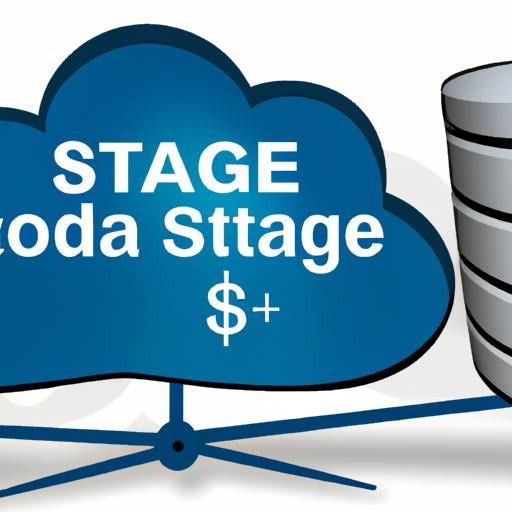Best Cloud Storage for Large Amounts of Data: Ensuring Efficient Data Management

In today’s digital era, the rapid growth of data has become a ubiquitous challenge for businesses and individuals alike. As we generate and accumulate vast amounts of information, the need for efficient and reliable storage solutions has become more critical than ever. This is where cloud storage comes into play, offering a scalable and secure option for managing large volumes of data. But with countless providers available, how do you choose the best cloud storage option that will meet your specific requirements?
Finding the right cloud storage solution is paramount to ensure seamless data management and accessibility. Whether you’re a business dealing with extensive customer records, a content creator handling high-resolution media files, or an individual with a growing collection of photos and videos, the best cloud storage service can provide the necessary infrastructure to address your needs.
Selecting the ideal cloud storage provider involves considering several key factors. Scalability is crucial to accommodate the expanding size of your data. As your storage requirements increase, the chosen service should seamlessly scale up to prevent any disruptions. Additionally, robust security measures are imperative to safeguard your sensitive information. Look for providers that employ encryption protocols and multi-factor authentication to ensure the utmost protection.
Reliability is another vital aspect to consider when entrusting your data to a cloud storage provider. Downtime can have significant consequences for businesses, causing disruptions in operations and potential data loss. Therefore, opt for a service with a proven track record of high uptime performance to minimize any potential risks.
Lastly, cost plays a crucial role in determining the right cloud storage option. Evaluate different pricing structures and plans offered by providers to find the balance between affordability and the features you require. Remember, the goal is to optimize your storage capabilities without breaking the bank.
By carefully assessing these factors, you can identify the best cloud storage solution that caters to your specific needs. In the following sections, we will explore the top cloud storage providers for large amounts of data, comparing their performance, storage capacity, security measures, and pricing plans. Join me as we embark on this journey to find the ideal cloud storage solution that ensures efficient data management.
Understanding the Challenges of Large Data Storage

A. Complexities of Managing and Storing Large Amounts of Data
Managing and storing large amounts of data pose significant challenges that go beyond the capabilities of traditional storage methods. As the volume of data increases, organizations and individuals face difficulties in handling and organizing this information effectively.
Firstly, the sheer size of large datasets requires advanced storage solutions that can accommodate the scale. Traditional storage methods, such as physical hard drives or local servers, often have limited capacity and can quickly become overwhelmed when dealing with massive data sets. This leads to frequent hardware upgrades, increased costs, and potential data loss due to insufficient storage space.
Another complexity is the need for efficient data organization and retrieval. With vast amounts of data, finding specific files or information can become a time-consuming and cumbersome task. Traditional storage methods lack features that enable easy categorization, searchability, and metadata management, making it challenging to locate and access data when needed.
B. Limitations of Traditional Storage Methods
Traditional storage methods, such as on-premises servers or external hard drives, have inherent limitations when it comes to managing large amounts of data. These limitations include storage capacity, scalability, and accessibility.
Firstly, traditional storage methods often have finite storage capacity. External hard drives have physical limits, and on-premises servers require costly hardware upgrades to increase storage capacity. This limitation can hinder the expansion of data storage and lead to potential data loss or the need for additional storage space.
Scalability is another issue with traditional storage methods. As data volumes grow exponentially, the need for scalable solutions becomes imperative. However, traditional storage methods can be difficult and time-consuming to scale, requiring manual interventions, hardware additions, or complex configurations.
Furthermore, traditional storage methods may lack accessibility, especially when data needs to be shared or accessed remotely. Physical hard drives or on-premises servers may restrict access to specific locations or devices, limiting collaboration and remote work capabilities.
Understanding these challenges and limitations highlights the necessity of finding alternative solutions that can effectively handle large amounts of data. In the following sections, we will explore the top cloud storage providers that offer scalable, secure, and efficient storage options for managing extensive data sets.
Key Factors to Consider in Selecting Cloud Storage for Large Data

When it comes to selecting the best cloud storage for managing large amounts of data, there are several key factors that you should carefully consider. These factors will ensure that you choose a solution that not only meets your immediate needs but also provides scalability, security, reliability, and cost-effectiveness in the long run.
A. Scalability: Assessing the Ability to Handle Growing Data Volumes
One of the primary concerns when dealing with large amounts of data is scalability. As your data grows over time, you need a cloud storage provider that can seamlessly scale up its resources to accommodate your increasing storage requirements. Consider the provider’s ability to handle massive data volumes and whether it offers flexible storage options that can grow alongside your needs. This ensures that you won’t face any limitations or disruptions as your data expands.
B. Security: Safeguarding Sensitive Data with Robust Measures
Data security should be a top priority when choosing a cloud storage solution. With large amounts of data at stake, it is crucial to opt for a provider that prioritizes robust security measures. Look for features such as end-to-end encryption, data redundancy, and secure access controls. Additionally, consider the provider’s compliance with industry standards and regulations to ensure the protection of your sensitive information. A strong security framework will give you peace of mind, knowing that your data is well-protected.
C. Reliability: Evaluating Uptime Performance and Reliability
Reliability is key when it comes to cloud storage. Downtime can lead to disruptions in operations, loss of productivity, and potential data loss. Therefore, it is essential to choose a provider with a solid track record of high uptime performance. Research the provider’s infrastructure, data centers, and network capabilities to assess their reliability. Additionally, consider their disaster recovery plans and backups to ensure that your data remains accessible and protected even in the face of unexpected events.
D. Cost: Examining Pricing Structures and Cost-effectiveness
While it’s important to prioritize quality and features, cost-effectiveness is also a crucial factor to consider. Evaluate the pricing structures and plans offered by different cloud storage providers. Look for transparent pricing models that align with your budget and storage requirements. Consider any additional costs for exceeding storage limits or accessing advanced features. It’s essential to strike the right balance between affordability and the features and storage capacity that your data demands.
By thoroughly assessing these key factors, you can make an informed decision when selecting the best cloud storage solution for managing large amounts of data. In the next section, we will explore the top cloud storage providers that excel in these areas, helping you narrow down your options and find the perfect fit for your needs.
Top Cloud Storage Providers for Large Data

When it comes to managing large amounts of data, selecting the right cloud storage provider is crucial. To help you make an informed decision, let’s delve into the top three recommended providers and explore their features, benefits, and limitations.
A. Provider 1: Analyzing the Features, Benefits, and Limitations
Provider 1 offers a comprehensive set of features tailored for handling vast data volumes. With their scalable infrastructure, you can seamlessly expand your storage as your needs grow. Additionally, their advanced security measures, including encryption and regular backups, ensure the protection of your valuable data. However, keep in mind that their pricing structure may be on the higher end, making it more suitable for businesses with substantial storage requirements.
B. Provider 2: Reviewing the Strengths and Weaknesses
Provider 2 stands out for its user-friendly interface and seamless integration with other cloud-based services. Their intuitive platform simplifies data management, allowing you to effortlessly organize, access, and share your files. While their pricing plans are competitive, their storage capacity might be more limited compared to other providers. If you’re a content creator or an individual with moderate storage needs, Provider 2 could be an excellent choice.
C. Provider 3: Discussing Suitability for Managing Large Data
Provider 3 specializes in catering to enterprises and businesses dealing with massive data volumes. Their robust infrastructure ensures high performance and reliability, minimizing the risk of downtime. Moreover, their advanced data analytics and collaboration features enable efficient data processing and teamwork. However, due to their focus on enterprise-level solutions, their pricing might be less budget-friendly for smaller-scale users.
By carefully considering the features, benefits, and limitations of these top cloud storage providers, you can align their offerings with your specific storage needs. Remember to assess factors such as scalability, security, pricing, and compatibility with your existing workflows. In the next section, we will compare these providers in terms of performance, storage capacity, security measures, and pricing plans, allowing you to make a well-informed decision for your large data storage requirements.
Comparison of Cloud Storage Providers
A. Performance: Speed and Performance Evaluation
When it comes to managing large amounts of data, the performance of a cloud storage provider is crucial for seamless operations. It’s essential to consider the speed at which you can upload and retrieve your data from the cloud. Some providers offer faster transfer speeds, enabling you to efficiently handle large files or datasets. Additionally, evaluating the performance of their servers and infrastructure ensures smooth access to your data without any lags or delays. By comparing the performance metrics of different cloud storage providers, you can make an informed decision based on your specific requirements.
B. Storage Capacity: Evaluating Offerings
Another significant factor to consider in the comparison of cloud storage providers is their storage capacity offerings. Assess the amount of data each provider allows you to store in their cloud infrastructure. Some providers offer tiered storage plans, allowing you to scale up your storage capacity as your data grows. Consider the pricing and flexibility of storage plans to ensure that you have sufficient space to accommodate your current and future needs. Adequate storage capacity is vital to prevent any disruptions or limitations in storing large amounts of data.
C. Security Measures: Protecting Your Data
Data security is of utmost importance when selecting a cloud storage provider for large amounts of data. Evaluate the security features and protocols implemented by each provider to protect your valuable information. Look for providers that offer end-to-end encryption, both during transmission and while at rest in their storage infrastructure. Multi-factor authentication, data redundancy, and regular backups are additional security measures to consider. By comparing the security measures of different providers, you can ensure that your data remains protected from unauthorized access or breaches.
D. Pricing: Cost-Effectiveness Analysis
Analyzing the pricing plans and packages offered by various cloud storage providers is essential to determine the most cost-effective option. Consider the storage capacity, additional features, and services included in each plan. Some providers offer tiered pricing based on the amount of storage required, while others have flat-rate plans. Take into account your projected storage needs and compare the pricing models to find the best fit for your budget. Remember, it’s not just about finding the cheapest option, but rather the one that offers the most value for your investment.
By comparing the performance, storage capacity, security measures, and pricing plans of different cloud storage providers, you can make an informed decision that aligns with your specific needs. Evaluate these factors carefully to ensure that you select the best cloud storage option for efficiently managing large amounts of data. In the next section, we will conclude our exploration by summarizing the key points discussed and providing a final recommendation.
Conclusion: So above is the Best Cloud Storage for Large Amounts of Data: Ensuring Efficient Data Management article. Hopefully with this article you can help you in life, always follow and read our good articles on the website: WEEKLY NEWS




